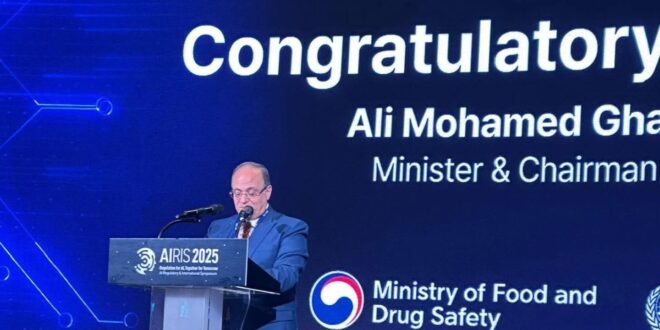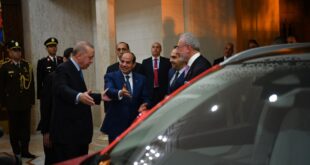Sahar Ragab
In a testament to deepening bilateral ties, Dr. Ali Al-Ghamrawy, President of the Egyptian Drug Authority (EDA), affirmed that Egyptian-Korean relations are “built on mutual respect and shared ambitions,” emphasizing a united vision for the future of pharmaceutical innovation.
“Today, we are closer than ever—not just by our history of cooperation, but by our common outlook on advancing drug innovation,” Al-Ghamrawy stated during his participation in the International AI Regulatory & International Symposium (AIRIS 2025) in South Korea.
The remarks came amid the three-day global symposium, held from September 10 to 12 at the Inspire Resort in Incheon, co-hosted by the South Korean Ministry of Food and Drug Safety (MFDS) and the
World Health Organization (WHO).
The event gathered regulators
, industry leaders, academics, and experts to explore AI’s role in medical product development and regulation, fostering international collaboration to harness technology for safer, more efficient healthcare solutions.
A Platform for Global Dialogue on AI in Pharma
AIRIS 2025 served as a pivotal forum for discussing how AI can streamline regulatory processes, enhance drug safety, and accelerate approvals for innovative therapies.
Attendees included Oh Yu-kyoung, Minister and President of the MFDS, representatives from various drug authorities worldwide, WHO officials, and key stakeholders in the pharmaceutical sector.
Sessions delved into topics like AI-driven pharmacovigilance, ethical AI integration in clinical trials, and harmonizing global standards for AI-based medical devices.
Al-Ghamrawy’s participation underscored Egypt’s growing role in international health diplomacy. As a speaker, he highlighted the EDA’s initiatives in adopting AI for faster drug evaluations and post-market surveillance, aligning with Korea’s leadership in biotech innovation.
“Our partnership extends beyond bilateral agreements; it’s about co-creating a resilient global supply chain for medicines,” he added, referencing ongoing collaborations in vaccine development and biosimilars.
The symposium also featured contributions from companies like Hutom, a Korean AI and digital surgical navigation specialist, which showcased its technologies for real-time surgical guidance. Discussions emphasized bridging regulatory gaps between emerging markets like Egypt and advanced economies like South Korea, with a focus on equitable access to AI tools for developing nations.
Strengthening Ties: From History to Horizon
Egyptian-Korean pharmaceutical cooperation dates back decades, with joint ventures in manufacturing and research. Recent milestones include technology transfers for generic drugs and joint training programs under WHO auspices.
Al-Ghamrawy’s address at AIRIS reinforced this trajectory, calling for expanded memoranda of understanding on AI ethics and data sharing to combat counterfeit medicines—a mutual challenge in both regions.
Minister Oh echoed the sentiment, praising Egypt’s regulatory reforms as a model for Africa and the Arab world.
“Events like AIRIS remind us that innovation knows no borders; it’s through shared ambitions that we safeguard public health globally,” she noted in her opening remarks.
As AIRIS 2025 concludes, it leaves a legacy of actionable commitments, including a proposed working group on AI regulatory harmonization involving Egypt, Korea, and WHO. For nations like Egypt, this signals a strategic pivot toward AI-driven pharma leadership, promising economic growth and improved healthcare outcomes.
In an era of rapid technological change, the Egyptian-Korean alliance stands as a beacon for collaborative progress, turning shared visions into tangible realities for millions.
 موقع وجه أفريقيا موقع وجه أفريقيا هو موقع مهتم بمتابعة التطورات في القارة الأفريقية
موقع وجه أفريقيا موقع وجه أفريقيا هو موقع مهتم بمتابعة التطورات في القارة الأفريقية



